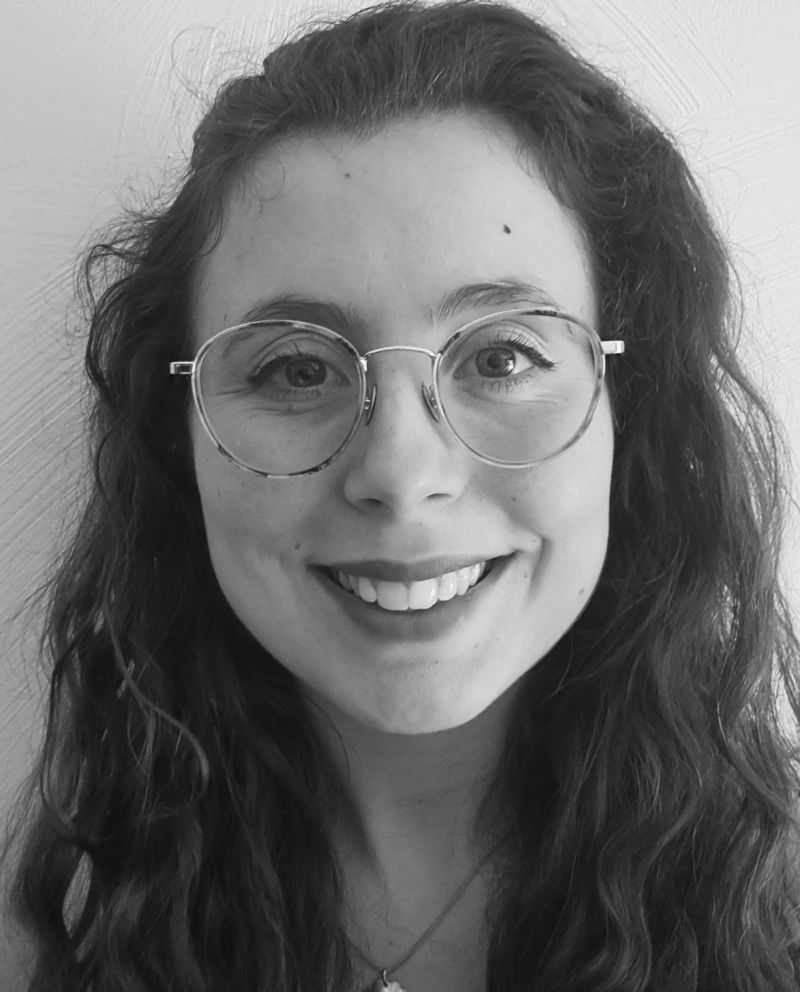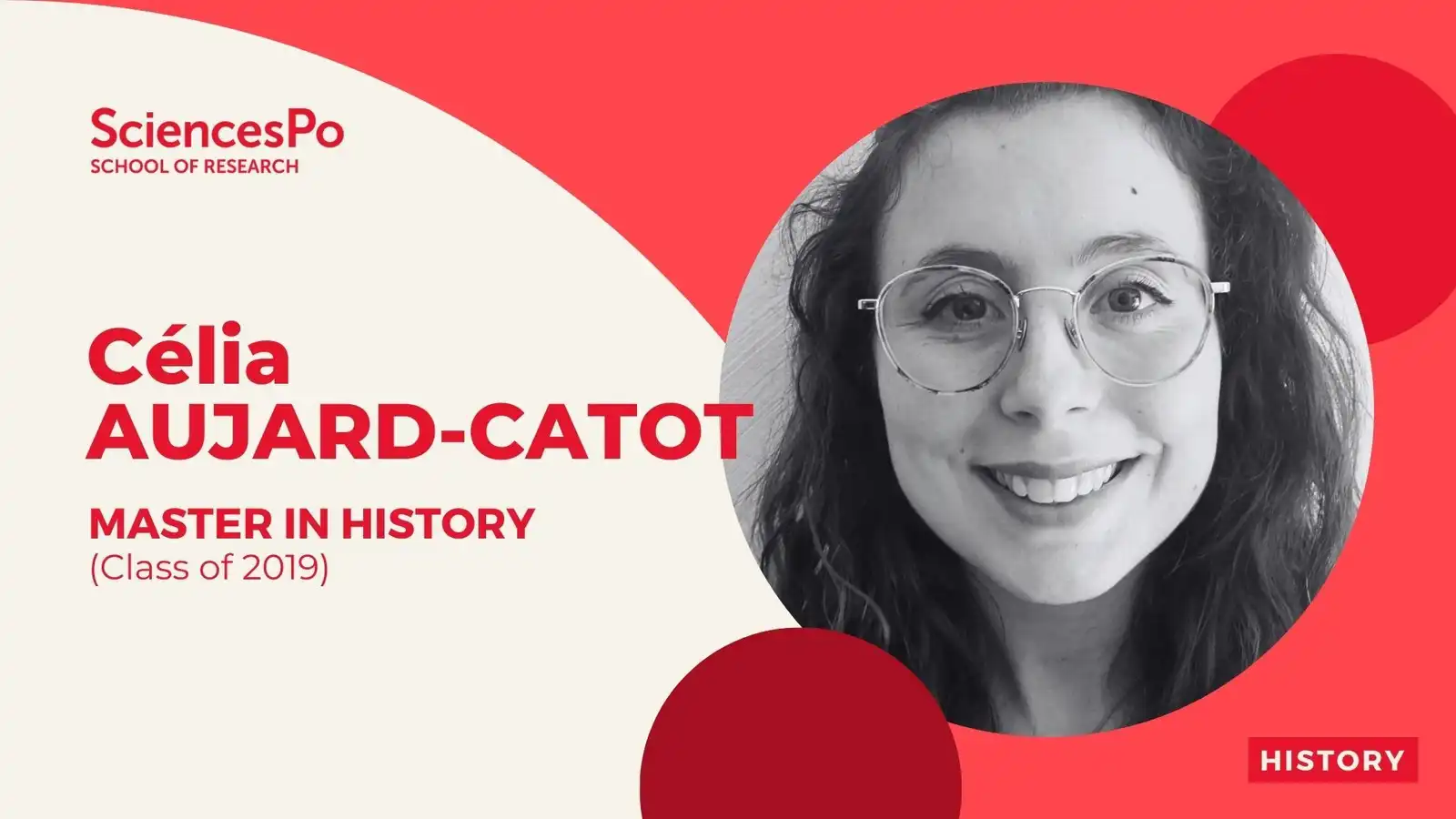Home>Célia Aujard-Catot, Class of 2019
13.06.2024
Célia Aujard-Catot, Class of 2019
CAN YOU TELL US ABOUT YOUR ACADEMIC BACKGROUND? HOW DID YOUR INTEREST IN HISTORY BEGIN?
My academic career has been shaped by the humanities and the arts. After a literary baccalauréat with a specialism in drama and an optional option in visual arts, I did two years of preparatory classes for the literary grandes écoles at the Lycée Carnot preparatory school in Cannes, majoring in history and art theory (history was already one of my favourite school subjects, both when it came to human societies and when it came to works of art, artists and artistic movements). I did a third year of preparatory classes at a different lycée, joining the A/L preparatory class at the Lycée du Parc in Lyon, still majoring in History and Theory of the Arts. It was in this class that I was able to take preparatory courses to enter Sciences Po and that I was able to prepare my application to the School of Research master's degree in History in particular.
I've been interested in history ever since I was at school; I've always loved learning about past events and how they were explained. I had some fascinating teachers who developed this taste for the humanities and the arts. But it was really during the preparatory classes that I decided to pursue a history degree. Various readings - both personal and academic - made me aware of my attraction for this subject. I also come from a family with a taste for knowledge and museums, so I've been walking on the floor of these places of learning since childhood; I wanted to immerse myself in the challenges of theory and research in history.

« Joining the School of Research at Sciences Po has had a profound effect on me and has given me a sense of fulfilment. »
Célia Aujard-Catot, Class of 2019
Head of Diploma Renovation at MASA
WHAT HAVE YOUR YEARS AT THE SCHOOL OF RESEARCH MEANT TO YOU? WHAT MEMORIES DO YOU HAVE OF YOUR SCHOOL, YOUR CLASS AND YOUR TEACHERS?
My years of study at the School of Research gave me a great deal, because I was able to open up the field of possibilities and make a variety of encounters - at relational, institutional and intellectual levels. I thrived on opening up new fields of thought. I really enjoyed choosing seminars on different subjects, with professors who were at the cutting edge and experts in their field, and who all had a different and constructive approach to thinking about and researching history. This enabled me to expand my knowledge and reflect on the different ways of constructing history and explaining events or periods, depending on the points of view taken or the historical schools followed, each of which has its own methodology.
Sciences Po has a library where I spent a lot of time working and consulting books. I really appreciated being able to sign up for sports activities such as RAC and climbing, and to take part in ‘dance and life’ classes in the Well-Being centre for students. I was even able to take photography classes with an artist and teacher whose teaching methods and personal contact I really appreciated. The general seminars and activity clubs gave me the opportunity to meet students from other schools, and it was interesting to talk to them.
My class was with me for two years - two years during which I was able to get to know people and develop strong friendships. There was a lot of mutual support between us. I also found it interesting to be able to compare points of view and the subjects we had each chosen to research for our final dissertation.
Joining the School of Researchhas had a profound effect on me and has given me a sense of fulfilment.
WHICH TEACHER OR COURSE OF STUDY HAS HAD THE GREATEST IMPACT ON YOU?
It's a difficult question, because I've had a lot of interest in different subjects and appreciated different teaching approaches.
Some teachers have had a big impact on me and taught me a lot, giving me a taste for their speciality. Other teachers have also made valuable contributions from a methodological point of view.
I would say... Sabine Dullin and her seminar on the history of the USSR really interested me. Elissa Mailänder's teaching on the construction of masculinity also made an impression on me. I'm also thinking of the fantastic classes given by Emmanuel Blanchard, who taught us how to make a historical documentary. I'm thinking of Hélène Bellanger's ‘Trials for History’ seminars, where we worked on the Pinochet trial and the trial archives.
WHAT IS YOUR CURRENT POSITION?
I'm currently working as a Diploma Renovation Officer at the Ministry of Agriculture and Food Sovereignty (MASA), in the General Directorate for Education and Research (DGER), more specifically in the Technical Education Service (SET) and the Technical Education Diplomas Office (BDET).
WHAT WERE THE MAIN STAGES IN THE DEVELOPMENT OF YOUR CAREER PLAN?
My career plan wasn't smooth, so to speak. I wanted to go into administration, but I was also very interested in the humanities and the arts.
So, after my Master's degree in 2019, I spent two years at Hôpital Sainte-Anne in Paris XIVe, at the Centre d'Étude de l'Expression (CEE), to get a diploma in art therapy. At the same time, I did a civic service placement in two geriatric hospitals of the AP-HP, followed by six-month placements, the first in a palliative care department and the second with a placement tutor who worked in a psychiatric hospital and also in a prison. These were great human and academic experiences. Just before I graduated as an art therapist, I joined the Draguignan local authority, in the cultural events department, as coordinator of a digital museum project; I then became a cultural mediator and in charge of mediation for young audiences at the Musée des Beaux-Arts. As well as writing my dissertation in art therapy, I worked on developing content to explain art to a range of audiences, as well as devising strategies to publicise the digital museum.
After two and a half years working for Draguignan town hall, I wanted to move more specifically into the civil service and administration. However, I still wanted to work in the educational and cultural sector, but in a different context. I'm also planning to take the competitive entrance exam to the regional institutes of administration (IRA). I applied for the job of Diploma Renovation Officer and got it; since then I've been working in the world of agricultural education, and more specifically, vocational diplomas and training.
I've always been attracted by the idea of contributing to the development of knowledge, whatever the field, but also by my interest in different career paths and different life paths.
HOW HAS YOUR TRAINING CONTRIBUTED TO YOUR CURRENT POSITION?
My training as a historian has taught me how to research and construct content to present or explain. I have also developed the formal rigour required for writing a history dissertation, as well as a taste for research and attention to methodology. As a result, I am meticulous about the architecture of the documents I write and present, I know how to construct and focus my argument, and I also use my training to research legal issues.
WOULD YOU HAVE ANY ADVICE FOR A STUDENT WHO WANTS TO MOVE INTO THE SECTOR IN WHICH YOU WORK TODAY?
First piece of advice: don't be afraid of presenting a smooth or uniform career path. Professional experience is always enriching, as long as you don't lose sight of the common thread of the sum of what you've done and who you are!
The practical advice I could give is to pay close attention to methodological advice, both in terms of research and data classification. It's important to organise your workload and your thoughts; well-constructed plans, whatever the type of writing, are always a winner, as they enable you to explain clearly and present rigorously. You also need to enjoy looking at the detail of texts and be vigilant in your thinking.
One last thing: it's essential to always have solid sources to support your arguments or as a basis for your thinking.
